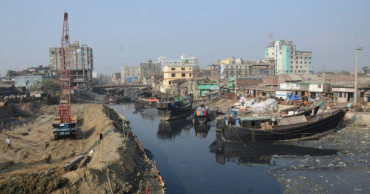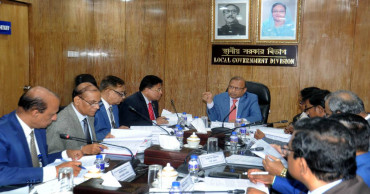river pollution
Encroachment, pollution threatening water bodies: Adviser Farida
Fisheries and Livestock Adviser Farida Akhter said on Wednesday that water bodies across Bangladesh are being closed off due to encroachment and pollution, posing a serious threat to fish production and the livelihoods of fishermen.
Speaking at a discussion with fisheries and livestock farmers at the Kushtia Deputy Commissioner’s conference hall, the adviser warned that water bodies, including haor, have been disappearing across the country. “This will reduce fish production and further affect fishermen,” she said.
Fishing ban in Bay to be reduced to 58 days: Fisheries Adviser
The adviser said the leasing of water bodies has to be reserved for fishermen only. According to her, the issue was under review, and an inter-ministerial meeting had recently been held between the land and livestock ministries to address it.
The adviser also urged farmers to avoid feeding fish and other livestock unhealthy food and medicine in the pursuit of quick profits. “Just as humans need safe food, fish and animal feed must also be safe. Relevant authorities must take effective action on this matter,” she said.
Bangladesh to export locally produced LSD vaccine in future: Fisheries and Livestock Adviser
Kushtia’s Additional Deputy Commissioner (Revenue), Md Abdul Wadud, along with district administration officials, farmers, and journalists, attended the discussion.
1 year ago
Time to save rivers from pollution, encroachment: Adviser Sakhawat
Shipping Adviser Brigadier General (retd) M Sakhawat Hossain on Monday issued a stark warning, stressing the immediate necessity to rid the country’s rivers of pollution and illegal encroachment.
“Bangladesh is a riverine country where people directly or indirectly rely on rivers. But in the name of development, rivers, canals, and wetlands have been encroached upon and polluted. To save our rivers, we must tackle these issues immediately,” he said while addressing a seminar at the Water Development Board in the capital.
The Ministry of Water Resources hosted the event with a focus on determining the number of rivers in Bangladesh.
Dr Hossain called for a coordinated approach among relevant ministries, departments, and agencies to protect rivers.
He highlighted the urgent need to clean up the Buriganga River during this winter season.
“The Ministry of Shipping will provide the necessary manpower and equipment for this initiative. All illegal structures along riverbanks must be demolished. Local administrations must play a more active role in protecting rivers, canals, and wetlands from pollution and encroachment,” he stressed.
Master plan for Matarbari deep-sea port being revised to meet global standards: Shipping Adviser
He said that the recurring issue of re-encroachment after eviction drives and pointed out the critical need to curb illegal sand extraction from rivers.
The adviser also urged authorities to ensure proper maintenance of urban drainage systems, many of which have been blocked or rendered ineffective.
Discussing the loss of navigability in major rivers, including the Buriganga, Dr Hossain advocated for planned dredging.
“Restoring the navigability of our rivers through dredging is a pressing necessity. Without this, our rivers will lose their historical and economic significance,” he added.
He lamented the pollution and encroachment of northern rivers and criticised the filling of canals to construct drains. He also called for a clear distinction between rivers and canals to better protect and manage water bodies.
The seminar, chaired by Secretary of the Ministry of Water Resources Nazmul Ahsan, was addressed by Advisor to the Ministry of Environment Syeda Rizwana Hasan.
The participants included senior officials from the Water Development Board, divisional commissioners, and deputy commissioners, with many joining it virtually.
1 year ago
Govt takes up masterplan to prevent river pollution in and around Dhaka: LGRD Minister
In an effort to prevent water pollution and to free the river banks from encroachment, the government has taken up a masterplan to prevent water pollution of six rivers in Dhaka and its adjacent areas, said Local Government and Rural Development (LGRD) Minister Md Tajul Islam.
“We must take coordinated efforts to prevent pollution of resources like water and air,” he said while speaking at a programme on ‘Master plan on Meghna River’ at a hotel in the city on Sunday.
He also urged the development partners to play a more active role in overcoming the damage caused by climate change.
Tajul also urged all to be more cautious to protect the resources like water from pollution.
2 years ago
WASA key reason behind pollution of Dhaka’s rivers, NRCC chairman says
Although there are directives from the country’s highest court to save rivers, authorities concerned have failed miserably to stop pollution and encroachment. Thus, rivers around Dhaka city are still being polluted.
In an interview with UNB, Dr Manjur Ahmed, chairman of National River Conservation Commission (NRCC), put a major share of the blame on Dhaka WASA.
Dhaka WASA’s failure to construct enough sewerage lines has created a disastrous situation. Factories in and around Dhaka dispose of waste into the rivers surrounding the city. Combination of household and industrial wastes has turned rivers like Buriganga and Shitalakhya “ecologically dead”.
Read:Buriganga Pollution: Contempt rule issued against Wasa MD
“All the human waste produced in Dhaka city goes into the four rivers surrounding it. This happens due to Dhaka WASA’s failure to manage the waste. Excrement and rainwater go to the rivers through the same pipe. It was WASA’s duty to set up separate pipes for proper flow of the wastes. They didn’t do so, and as a result rivers are being polluted fast,” said Manjur.
The NRCC chairman added that although much of the grabbed lands by the rivers have been recovered, pollution couldn’t be stopped as those responsible were not brought under the law.
“At least four crore people live in and around Dhaka city but there isn’t a single river or waterbody where people can bathe. Population density, unmanageable development, withdrawal of water in the upstream and climate change are affecting the country’s rivers. As an organization working to conserve rivers, NRCC is acutely aware of these problems,” said Manjur.
Read:Dhaka rivers get polluted, WASA moves to supply water from Meghna
About NRCC, Manjur said that the role of his organization is to identify the problems and provide recommendations to the concerned authorities.
“NRCC is a relatively new organization. Some recommendations made by us have already been implemented and others are pending with the authorities. So far, we’ve identified 57,000 illegal encroachers and evicted 14,000 of them through the help of the district administrations and Bangladesh Inland Water Transport Authority (BIWTA),” said Manjur.
On the demarcation of river boundaries, the NRCC chairman said that it’s a tough task.
Read Tajul briefs JS on Wasa, city corporations' projects to serve capital
“The boundaries of Buriganga, Turag and Balu rivers have already been demarcated. I hope that the rest of the rivers will also be demarcated gradually,” said Manjur.
On the master plan that NRCC was preparing, Manjur said that it is yet to be completed.
“The process of preparing the master plan was interrupted due to the Covid-19 pandemic. I hope that we’ll be able to complete the master plan within a short time,” the NRCC chairman said.
Read LGRD Minister directs WASA to fix water price in capital rationally
During the interview, he informed UNB that his organization aims to put an end to pollution of the rivers surrounding Dhaka within March 17, 2023, which is the birth anniversary of Father of the Nation Bangabandhu Sheikh Mujibur Rahman.
“We’ll provide directives to all the government and private establishments in Dhaka and adjacent areas to stop polluting the rivers surrounding the city very soon. Legal steps will be taken if anyone breaches the rules and fails to comply with the directives,” Manjur said.
3 years ago
20-year masterplan to revive Dhaka's rivers in the works
A 20-year masterplan will be adopted by the government to return life to the rivers surrounding capital Dhaka - by preventing their pollution, ridding them of illegal occupation and long-term beautification.Work is already underway to remove illegal establishments along the rivers and building walkways and through afforestation.Besides, the government plans to generate electricity from river waste and to take steps in closing the sources of river pollution, said sources within the Ministry of Shipping.
Read: 60 illegal establishments evicted from Kirtankhola river banksThe masterplan which also aims to increase the navigability of rivers alongside preventing river pollution and encroachment, is currently in the final stages of being drafted.The masterplan has been prepared by reviewing the current situation of the tributaries, rivers and canals of Dhaka and the surrounding districts.According to the draft plan, the status quo will be developed in four steps, through a 1-year crash program, a short term plan of three years, a middle term plan of 5 years and a long term plan of 10 years.
Read Experts seek master plan for sustainable river dredging
According to Bangladesh Inland Water Transport Authority, around 113 acres of illegally occupied land belonging to rivers has already been regained as part of the process.In the first phase, 10,000 boundary pillars, 52-km walkways, 3 eco parks and 19 jetties will be constructed on the banks of the rivers freed by the eviction drive.The project will cost Tk 800 in crore in the initial stage as per the draft, added the sources.
Read Government urged to prepare integrated power-energy master plan
Emphasis has been given to build eco-parks on the banks of the Buriganga and Turag to attract tourists.
4 years ago
Limitless waste dumping vitiates Gorai river of Magura
The dumping of huge waste into Gorai River from adjacent Langalbandh Bazar in Sreepur upazila of Magura has continued for a long time. This has been polluting the river and the environment and spreading diseases, according to experts.
Langalbandh Bazar is located on the banks of the river Gorai at the endpoint of the two districts Magura and Jhenaidah. The river has been a dumping place for all the waste from the meat shop, the poultry shop, and the fish and kitchen market.
Read Bottle-shape wastebin to symbolise fight against plastic pollution and waterlogging
Cattle are slaughtered in the open place and wastes from the cattle are dumped on the bank of the river. As a result, there is a strong stench in the whole area. As there is no dumping station, cleaners and market traders are dumping garbage everywhere. Throwing garbage in different areas of the market has turned it into a garbage dump.
Moreover, the traders of the market are collecting the waste of the houses in the villages located near the market and dumping that in the rivers. And so, the environment-nature and biodiversity have been threatened and the entire area has suffered. Pedestrians coming from different areas have to endure the stench.
Read: Kopotakkho now a garbage dumping ground in Chougachha
As there is no designated place for dumping garbage here, Gorai river has been bearing the brunt. A large pile of garbage can be seen there which, according to experts, cause pollution and harm the environment.
Rahmat Ali, owner of Bhai Bhai Computer and Digital Studio in the market, said the garbage should be dumped at designated places. Then the river will be saved.
Valiant freedom fighter Abdul Gafur Mandal said, as there is no waste disposal system in the market, the common people are unknowingly throwing these wastes in the river.
Read Plastic waste increases from 178 tons per day in 2005 to 646 tons in 2020 in Dhaka
As a result, the river is getting polluted, the navigability is lost and the environment is losing its balance. Ordinary people are being harmed in many ways.
In this regard, Shailkupa Upazila Nirbahi Officer Kaniz Fatema Liza said a decision would be taken after inspecting the market as it is located between the two upazilas.
Abdul Halim Mollah, advisory chairman of the Bazaar Banik Samiti, said that the environment of the area was being polluted due to the dumping of garbage in the river as there was no designated place. The place of the cattle market was also full of garbage.
Read: Thousands suffer for ill-planned dumping station in Panchagarh
At the same time, ordinary pedestrians are constantly suffering due to the lack of adequate number of dustbins. Due to lack of enough space in the market, makeshift marts are being set up everywhere around the river.
Member Chand Ali said that most of the garbage in the market is brought and dumped in the open into Gorai River. This is the source of the strong foul smell. It is often seen that passengers are crossing the Naduria ferry ghat of Gorai River covering their noses with handkerchiefs.
Deb Kumar from Langalbandh area said the amount of garbage being dumped in the river has threatened the very existence of the river in the next 20 years.
Read Fighting plastic pollution: EcoVia working to transform RMG waste
However, the Sreepur Upazila administration said the market committee will be given the responsibility to dispose of the garbage at the designated place very soon. Even then, if the garbage is dumped into the river, action will be taken through the mobile court, he said.
4 years ago
Hilsa to be tastier this year as lockdown cleans up rivers: Expert
People will get more delicious hilsa on their plates this year thanks to drop in river pollution due to suspension of river transport movement for several months due to coronavirus pandemic, says an expert.
Dr Anisur Rahman, a renowned hilsa expert at Fisheries Research Institute, Chandpur, came up with the information while talking to UNB.
“We have examined the river water and found that the pollution level in the river has reduced due to the suspension of river vessel movement amid the Covid-19 pandemic. The condition of the river was quite congenial to availability of fish food. So, this year's hilsa will be more delicious, more flavorful,” he added.
Hilsa has become available now in local markets due to the rise in river water level and rain while though August, September and October months are the peak time to jave hilsa, he said.
5 years ago
Government taking action to tackle dengue: Minister
Local Government and Rural Development (LGRD) Minister Md Tazul Islam on Sunday said that government is taking action to tackle dengue problem this year using last years’ experience.
6 years ago






.jpg)






